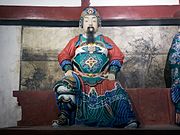Deng Zhi | |
|---|---|
| 鄧芝 | |
 | |
| General of Chariots and Cavalry (車騎將軍) | |
| In office 243–251 | |
| Monarch | Liu Shan |
| Inspector of Yan Province (兗州刺史) (nominal) | |
| In office 234–243 | |
| Monarch | Liu Shan |
| General of the Vanguard (前將軍) | |
| In office 234–243 | |
| Monarch | Liu Shan |
| Vanguard Military Adviser (前軍師) | |
| In office 234–243 | |
| Monarch | Liu Shan |
| General Who Spreads Martial Might (揚武將軍) | |
| In office 227–234 | |
| Monarch | Liu Shan |
| Chancellor | Zhuge Liang |
| Central Supervisor of the Army (中監軍) | |
| In office 227–234 | |
| Monarch | Liu Shan |
| Chancellor | Zhuge Liang |
| Master of Writing (尚書) | |
| In office c. 221–227 | |
| Monarch | Liu Bei / Liu Shan |
| Chancellor | Zhuge Liang |
| Administrator of Guanghan (廣漢太守) | |
| In office ? – c. 221 | |
| Prefect of Pi (County) (郫令) | |
| In office c. 214–? | |
| Personal details | |
| Born | 178[1] Xinye County, Henan |
| Died | 251 (aged 73)[2] |
| Resting place | Zitong County, Sichuan |
| Relations | Deng Yu (ancestor) |
| Children | Deng Liang |
| Parent |
|
| Occupation | Official, diplomat, general |
| Courtesy name | Bomiao (伯苗) |
| Peerage | Marquis of Yangwu Village (陽武亭侯) |
Deng Zhi (178 - 251),[a][2][1] courtesy name Bomiao, was a government official, diplomat and military general of the state of Shu Han during the Three Kingdoms period of China. A descendant of Deng Yu, Deng Zhi started his career in the late Eastern Han dynasty under the warlord Liu Bei as a low-level officer in Pi County. After Liu Bei discovered his talent, Deng Zhi steadily rose through the ranks to become a county prefect and later a commandery administrator and imperial secretary. In 223, the Shu regent Zhuge Liang sent him as Shu's envoy to meet Sun Quan, the ruler of Shu's ally state Wu, and reestablish the Wu–Shu alliance against their common rival state Wei. Deng Zhi succeeded in his mission and earned praise from Sun Quan for strengthening Wu–Shu ties. In 227, Deng Zhi became a military general and he participated in the first Shu invasion of Wei by leading a decoy force with Zhao Yun to distract the Wei general Cao Zhen. Although they lost the battle, Deng Zhi and Zhao Yun managed to rally their troops to put up a firm defence during their retreat and minimise their losses. Following Zhuge Liang's death in 234, Deng Zhi rose to higher general ranks and was stationed in present-day Chongqing for about 10 years before he was recalled back to the Shu capital Chengdu in his 70s to serve as General of Chariots and Cavalry. In 248, he suppressed a rebellion in Fuling (around present-day Pengshui County, Chongqing).[4] He died in 251.
- ^ a b Cihai, 6th edition (2009–10) Collectors' edition (辞海 第六版 典藏本) (ISBN 978-7-5326-3353-1/N.68)
- ^ a b Cite error: The named reference
death yearwas invoked but never defined (see the help page). - ^ de Crespigny (2007), p. 137.
- ^ De Crespigny, Rafe (2007). A Biographical Dictionary of Later Han to the Three Kingdoms 23–220 AD. Boston: Brill. p. 137. ISBN 978-90-04-15605-0.
Cite error: There are <ref group=lower-alpha> tags or {{efn}} templates on this page, but the references will not show without a {{reflist|group=lower-alpha}} template or {{notelist}} template (see the help page).